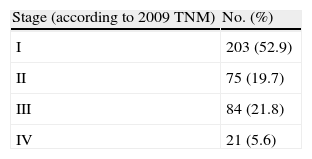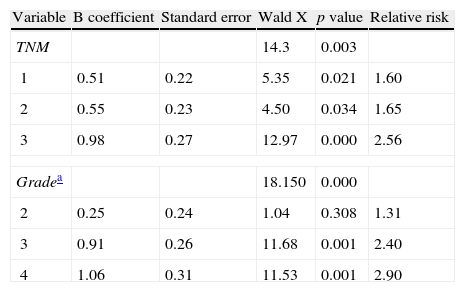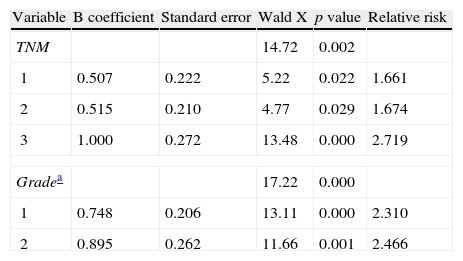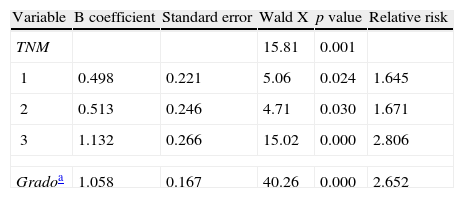To evaluate if re-grading renal cell carcinoma (CRCC) in two or three-tiered grading schemes vs the traditional Fuhrman classification maintains the same prognostic value.
Material and methodsA study of a cohort of 383 treated CRCC with radical or partial nephrectomy between 1990 and 2009 was made. We analyzed the demographic data, evolution and survival of these patients. An uropathologist reassigned the Fuhrman grades blindly to the first classification. In order to study if the prognostic value was maintained with the different classification, three Cox multivariate regression analysis were performed, classifying the variable of grade into four categories: (I-II-III-IV), into three (I+II-III-IV) and into two (I+II-III+IV). The explanatory variables were: age, gender, tumor size, study stage and grade. The response variables were progression-free survival (local-regional recurrence/metastasis) and cancer specific survival time.
ResultsThe median overall survival was 125 months (95% CI: 92–159). In the three multivariate analyses carried out, the Fuhrman classification showed independent predictive value (p=0.0001) compared to progression-free survival and cancer specific survival. The predictive power was maintained in the new classifications. In the three categories, the changing from grade I+II to III meant RR: 2.31 (p=0.0001) and from grade III to IV RR: 2.47 (p=0.0001) and in two-tiered classification an RR: 2.8 (p=0.001) was found when changing from I+II to III+IV.
ConclusionsOur results show that categorizing the Fuhrman grade into three or two-tiered grading schemes provide the same predictive accuracy on progressive free survival and cancer specific survival. Grades III and IV have different outcomes so that the three-tiered classification seems to be more appropriate to described the course of these patients.
Evaluar si la re-clasificación de los carcinomas renales de células claras (CRCC) en dos o tres grados de Fuhrman (GF) frente a la clasificación clásica mantiene su valor pronóstico.
Material y métodosEstudio sobre una cohorte de 383 CRCC tratados con nefrectomía radical/parcial (1990-2009). Se analizaron datos demográficos, evolución y supervivencia de los pacientes. Un uropatólogo reasignó los grados de Fuhrman de forma ciega al informe original. Para estudiar si se mantenía el valor pronóstico con las distintas clasificaciones se realizaron tres análisis de regresión múltiple de Cox, categorizando la variable grado en 4 categorías(I-II-III-IV), en tres (I+II-III-IV) y en dos (I+II-III+IV). Las variables explicativas fueron: edad, sexo, tamaño tumoral, estadio y grado. Las variables respuesta fueron: tiempo de supervivencia libre de progresión (recidiva locorregional/metástasis) y de supervivencia cáncer-específica.
ResultadosLa mediana de supervivencia global fue de 125 meses (IC 95%: 92-159). En los tres análisis multivariantes el grado de Fuhrman demostró valor predictivo independiente (p=0,0001) frente al estadio para la supervivencia libre de progresión y supervivencia cáncer-específica. El valor pronóstico se mantuvo en las nuevas clasificaciones. En la de tres categorías el paso del grado I+II al III presentó un RR: 2,31(p=0,0001) y del grado III al IV un RR: 2,47(p=0,0001) y en la de dos categorías se observó un RR: 2,8 (p=0,001) al pasar del grado I+II al III+IV.
ConclusionesLa categorización en dos o tres grupos del grado de Fuhrman mantiene la capacidad predictiva sobre la supervivencia libre de progresión y cáncer-específica. Los grados III y IV presentan evoluciones distintas, por lo que la clasificación en tres categorías parece más adecuada para describir la evolución de estos pacientes.













